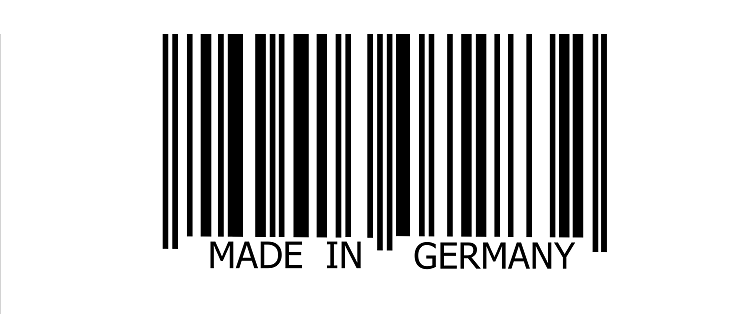 Quelle: iStock.com/flik47
Quelle: iStock.com/flik47
“Made in Germany” is sexy again!
21. August 2018 Published by Raphael DoerrYou don’t need to have studied business or economics to know that “Made in Germany” stands worldwide for quality, hard work, ambition, precision and exceptional craftsmanship. These attributes embody what makes Germany so respected throughout the world. And that will endure. Not even the emissions scandals reported on worldwide by the press for months can inflict lasting damage on this brand.
German seal of quality from England
Yet that wasn’t always the case – Germany had to work hard for many decades to earn its image as a quality producer. “Made in Germany” dates back to 1887 and the English Merchandise Marks Act, under which all products imported from Germany had to bear that label. The aim back then was to protect the UK, as an exporting nation, against often cheap and inferior imitations from Germany. “Made in Germany” was a warning that the goods were of poor quality. However, the quality of Germany manufacturers improved hugely toward the end of the 19th century, with the result that “Made in Germany” soon became a label denoting top-quality goods. It wasn’t long before consumers all over the world specifically demanded German products. The fact that Germany has become the export world champion can in part be attributed to this designation of origin.
Manufacturers are returning to Germany
Companies all over the world have relocated manufacture of their goods and products abroad for economic reasons. Production in low-wage countries like China was and still is attractive, especially in the technology and textile sectors, where such countries have the required know-how coupled with low labor costs. Yet more and more companies are now moving production – or at least parts of it – back to Germany. Germany is “in” again as a manufacturing location. Around 20 percent of German industry’s production capacities are located abroad. But for every fourth company that locates production abroad, one returns – in particular from Eastern Europe and Asia (source). They include prestigious names such as Adidas or the smartphone manufacturer Gigaset.
The reason: internal and external influences
The reasons cited for this retreat are, in particular, quality deficiencies and less flexibility in production. That’s also corroborated by Raphael Dörr, Head of Corporate Communications & Investor Relations at Gigaset: “Making smartphones in Bocholt gives us far greater flexibility and logistics benefits. We can respond quickly to customers’ requirements.” Adidas voices similar motivation in the German newspaper Süddeutsche Zeitung (source): Jan Hill, who heads the “Future Team” at the Adidas headquarters in Herzogenaurach and is in charge of the “Speedfactory” project, states that Adidas aims to speed up production even further and thus be close to its customers. However, external factors also make life more difficult for today’s entrepreneurs, since the world has become more unpredictable. Hardly a day passes without reports on and talk of trade tariffs. Open markets can no longer be taken for granted as they were not so long ago. All this unrest compels manufacturers to question their usual processes and procedures.
Industry 4.0 delivers competitiveness
It’s not a given that companies who produce in Germany can compete with those who make goods abroad – an electronics manufacturer specifically faces the challenge of rivals such as Apple or Samsung. So how can you keep up with multinationals with low-cost production operations in Shenzhen, China? Thanks to cutting-edge production technologies, in particular Industry 4.0, which permits cost-effective, modern production – even domestically. Automation and flexible production facilities mean that goods can also be made cheaply, in a high quality and quickly here in Germany. Industry 4.0 is based on intelligent, digitally connected systems that allow production to be largely self-organized. People, machines, systems, logistics and products communicate and cooperate with each other. The main work is done by robots, which enable a high degree of flexibility: Production processes can be adjusted and adapted at little cost and effort.
Smartphones “Made in Germany”
Gigaset is the first manufacturer to make smartphones in Germany and is proving that electronics products like them do not necessarily have to be made in the Far East where there are ample workers and component suppliers. The new Gigaset GS185 is made exclusively in Bocholt, which has the capacity to produce up to 6,000 of them a week. The degree of automation is already 70% and growing. The proportion of value added created in production of the Gigaset GS185 in Germany is well in excess of 50%. That includes features that define the product, such as its design, technical concept and quality assurance during development. The optimized supply chain in Germany helps Gigaset reduce the entire logistics effort in terms of volume, weight, and material and product delivery, hence reducing the carbon footprint considerably.
The result is a reliable, durable smartphone that delivers very attractive value for money. Consumers gain numerous advantages from being close to the production site. First, Gigaset can respond to their wishes quickly and flexibly. For instance, customized designs (colors and logos), packaging and promotional packages, including accessory packs, can be implemented. Second, customers have clear benefits when it comes to service. The know-how acquired in production means products can be repaired far better and faster if needs be: 80% of the returned smartphones are repaired and sent back on the same day. Consumers get powerful smartphones, retail and sales partners appreciate the simple logistics, and the environment also gains – yes, “Made in Germany” is sexy again!
 Comments
Comments
 en
en 







